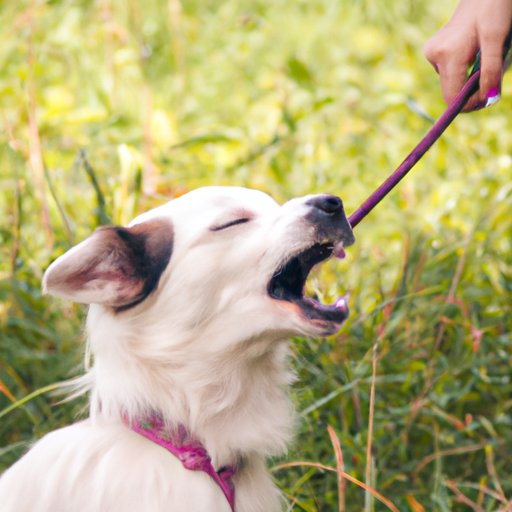
I. Introduction
Dogs are beloved pets and loyal companions, but they have the potential to bite under certain circumstances. Dog bites can be painful, traumatic, and even life-threatening, especially for young children or elderly individuals. That’s why preventing dog bites should be a top priority for all dog owners. In this article, we’ll be exploring different ways to stop a dog from biting, including training techniques, positive reinforcement, socialization, bite inhibition, and professional help.
II. Establishing Dominance and Respect Through Training
Training your dog is crucial for establishing clear rules and expectations. Dogs thrive in environments where they know what is expected of them and feel secure. There are several tips to follow when training your dog:
– Be consistent. Dogs learn through repetition and consistency. Ensure that you use the same commands and rewards each time you train.
– Use reward-based methods. Dogs respond best to positive reinforcement, such as treats, praise, and toys. Use a calm and friendly tone when training, and avoid harsh physical punishment.
– Celebrate small victories. Every time your dog follows a command, reward them immediately. This will help reinforce the behavior and encourage your dog to repeat it.
Training your dog has many benefits, including improving communication and safety. When you establish dominance and respect through training, your dog is more likely to listen to your commands, which can prevent dangerous situations.
III. Encouraging Positive Behavior
While it can be tempting to punish your dog for negative behavior, this can actually worsen the problem. Instead, focus on recognizing and reinforcing positive behavior. This can include:
– Praising your dog for good behavior. Give your dog a treat or verbal praise for obeying commands or exhibiting good behavior.
– Ignoring bad behavior. If your dog is acting out, such as jumping on you or biting, it’s best to ignore them rather than punishing them. When you don’t respond to bad behavior, your dog will learn that it doesn’t get attention.
Positive reinforcement can improve trust and bonding between you and your dog. When your dog feels secure, they are less likely to act out.
IV. Encouraging Socialization
Socialization is crucial for dogs because it helps them build confidence and reduces anxiety in new situations. To socialize your dog:
– Start small. Introduce your dog to new people, animals, and environments in small doses, allowing them to gradually become more comfortable.
– Use positive reinforcement. Reward your dog with treats and praise when they exhibit good behavior in new situations.
Socializing your dog can improve their confidence, reduce anxiety, and promote healthy interactions with other animals and people.
V. Teaching Bite Inhibition
Bite inhibition refers to a dog’s ability to control the force of its bite. Teaching your dog bite inhibition is important because it reduces the risk of injury, especially when playing with people. To teach bite inhibition:
– Redirect biting behavior. If your dog is biting too hard, redirect their attention to a toy or treat.
– Reward softer mouth behavior. Praise and reward your dog when they exhibit gentler behavior with their mouth.
Teaching bite inhibition can help prevent injuries and foster a safer environment for playtime.
VI. Seeking Professional Help
In some cases, it may be necessary to seek professional help to stop a dog from biting. This is especially true if your dog has already bitten someone or has exhibited aggressive behavior regularly. A veterinarian or animal behaviorist can assess your dog’s behavior and create a customized treatment plan that addresses the underlying cause of the biting.
Professional help can offer the necessary support and knowledge to help you and your dog overcome the problem, with the ultimate goal of maintaining a safe and happy relationship.
VII. Conclusion
Stopping a dog from biting requires patience and consistency, but there are many effective techniques for preventing bites. Establishing dominance and respect through training, encouraging positive behavior, socialization, bite inhibition, and seeking professional help can all reduce the risk of injury and foster a happy, healthy relationship with your furry friend. Remember, if you’re struggling with dog biting, you’re not alone. Reach out to local pet organizations or professionals for assistance. Together, you can create a safer, happier environment for everyone.





